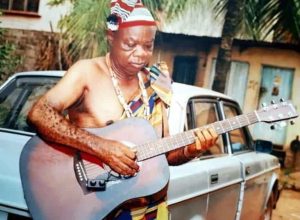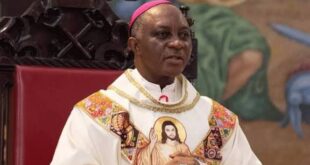 UMUAGBA, IMEZI-OWA, EZEAGU LG, ENUGU STATE, NIGERIA – Emmanuel Ejeagha, the eldest son of the late highlife legend Mike Ejeagha, has revealed the reason behind the swift burial of his father, who was laid to rest within 24 hours of his passing.
UMUAGBA, IMEZI-OWA, EZEAGU LG, ENUGU STATE, NIGERIA – Emmanuel Ejeagha, the eldest son of the late highlife legend Mike Ejeagha, has revealed the reason behind the swift burial of his father, who was laid to rest within 24 hours of his passing.
The veteran musician, popularly known for his hit song ‘Gwo gwo ngwo’, died on the night of Friday, June 6, 2025, at the age of 95. He was buried the next day, Saturday, June 7, at his country home in Umuagba, Imezi-Owa, Ezeagu Local Government Area of Enugu State.
Speaking on Sunday, June 8, 2025, Emmanuel Ejeagha explained that the family’s decision to bury the musician so quickly was in strict adherence to his father’s last wishes.
He disclosed that the late Ejeagha had specifically instructed the family not to embalm his body and to ensure his burial occurred within 24 hours of his death.
Emmanuel recounted that his father had repeatedly emphasized this request. As the first son, he took the responsibility seriously. “My father made a wish and warned us not to embalm him after his death”, he said.
He further shared: “I contacted members of my family and informed them that my father made a wish that he should be laid to rest 24 hours after his death. I also summoned a meeting of my kindred and we discussed extensively.”
According to Emmanuel, Enugu State Governor Peter Mbah was duly informed about the decision. After thorough discussions, all parties agreed that the late musician’s wishes must be respected. “They all consented that whatever was his wish should be kept”, he added.
Emmanuel emphasized the cultural and spiritual importance of honoring an elder’s instructions. “There are a lot of consequential results if an elder said something and otherwise was done”, he noted.
He further stated that although the burial had already taken place, a full funeral ceremony to honor the life and legacy of the iconic musician would be announced soon.
Mike Ejeagha was a towering figure on Nigerian radio in the 1980s, known for his distinctive blend of traditional Igbo storytelling and highlife rhythms. His music became a cultural bridge, resonating with both older and younger generations.
The resurgence of Ejeagha’s classic 1983 track, “Gwo Gwo Gwo Ngwo,” came through popular skit maker Chukwuebuka Emmanuel Amuzie, better known as Brain Jotter. The comic’s use of the song in his skits last year propelled the decades-old tune back into public consciousness.
The song “Gwo Gwo Gwo Ngwo” tells a humorous folk tale of how a cunning tortoise tricked an elephant, rode on it, and used it to pay the dowry for his bride – a timeless example of wit over strength that reflects the core of Igbo folklore.
The revival of Ejeagha’s song sparked a viral dance trend, particularly on TikTok and Instagram, where Brain Jotter’s videos racked up over 9.1 million followers on Facebook and more than five million on Instagram.
The dance moves inspired by the track evolved into a global challenge, with fans from different regions creating their own versions on various social media platforms, honoring Ejeagha’s legacy in a modern, digital way.
 Startrend International Magazine For Your Latest News And Entertainment Gists
Startrend International Magazine For Your Latest News And Entertainment Gists





